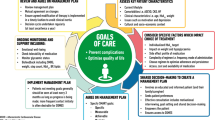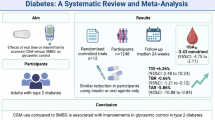Abstract
Purpose
To identify specific characteristics of women diagnosed with gestational diabetes who failed to achieve good glycemic control by lifestyle modifications only.
Methods
Retrospective analysis of women carrying a singleton pregnancy diagnosed with gestational diabetes. The cohort included 314 women who achieved good glycemic control by lifestyle modifications and 328 women who required anti-diabetic medications. Lifestyle modifications included medical nutrition therapy and physical exercise recommendations. Anti-diabetic medications included either oral treatment with metformin or glyburide and\or insulin.
Results
Women in the lifestyle modifications group were younger (32.87 vs. 33.79 years, p = 0.012) and had lower pre-pregnancy body-mass-index (25.86 vs. 27.93 kg/m2, p < 0.001). Glucose challenge test (GCT) was significantly lower in the lifestyle modifications group (158.31 vs. 171.04 mg/dL in the anti-diabetic treatment group, p < 0.001). Moreover, fasting oral-glucose-tolerance-test (fOGTT) results were significantly lower in the lifestyle modifications group (88.22 vs. 96.34 mg/dL in the anti-diabetic treatment group, p < 0.001). In a receiver-operator-curve analysis, GCT + 4*fOGTT, was the best model to predict lifestyle modifications failure with an area under the curve of 0.7419. Higher rates of vaginal delivery and lower rates of maternal hypoglycemia in the lifestyle modifications group were observed.
Conclusions
Maternal baseline characteristics and diabetes diagnostic parameters may predict which women will fail to achieve good glycemic control solely by lifestyle modifications.


Similar content being viewed by others
Data availability
Data will be made available and transparent, in conjunction with a pre-approved and valid scientific questions and in concordance with ethical approval.
References
Kelley KW, Carroll DG, Meyer A (2015) A review of current treatment strategies for gestational diabetes mellitus. Drugs Context 4:212282. https://doi.org/10.7573/dic.212282
Yogev Y, Melamed N, Chen R, Nassie D, Pardo J, Hod M (2011) Glyburide in gestational diabetes–prediction of treatment failure. J Matern Fetal Neonatal Med 24(6):842–846. https://doi.org/10.3109/14767058.2010.531323
Moyce BL, Dolinsky VW (2018) Maternal β-cell adaptations in pregnancy and placental signalling: implications for gestational diabetes. Int J Mol Sci 19(11):3467. https://doi.org/10.3390/ijms19113467
American Diabetes Association (2016) Classification and diagnosis of diabetes. Diabetes Care 39:13–22
Committee on Practice Bulletins-Obstetrics (2008) ACOG practice bulletin No. 190: gestational diabetes mellitus. Obstet Gynecol 131(2):e49–e64. https://doi.org/10.1097/AOG.0000000000002501
Arshad R, Karim N, Ara HJ (2014) Effects of insulin on placental, fetal and maternal outcomes in gestational diabetes mellitus. Pak J Med Sci 30(2):240–244. https://doi.org/10.12669/pjms.302.4396
Tieu J, Bain E, Middleton P, Crowther CA (2013) Interconception care for women with a history of gestational diabetes for improving maternal and infant outcomes. Cochrane Database Syst Rev. https://doi.org/10.1002/14651858.CD010211.pub2
Mitanchez D, Yzydorczyk C, Simeoni U (2015) What neonatal complications should the pediatrician be aware of in case of maternal gestational diabetes? World J Diabetes 6(5):734–743. https://doi.org/10.4239/wjd.v6.i5.734
Klein J, Charach R, Sheiner E (2015) Treating diabetes during pregnancy. Expert Opin Pharmacother 16(3):357–368. https://doi.org/10.1517/14656566.2015.988140
Sameshima H, Kamitomo M, Kajiya S, Kai M, Furukawa S, Ikenoue S (2000) Early glycemic control reduces large-for-gestational-age infants in 250 Japanese gestational diabetes pregnancies. Am J Perinatol 17(7):371–376. https://doi.org/10.1055/s-2000-13450
McFarland MB, Langer O, Conway DL, Berkus MD (1999) Dietary therapy for gestational diabetes: how long is long enough? Obstet Gynecol 93(6):978–982. https://doi.org/10.1016/s0029-7844(98)00547-x
Gadgil MD, Ehrlich SF, Zhu Y et al (2019) Dietary quality and glycemic control among women with gestational diabetes mellitus. J Womens Health (Larchmt) 28(2):178–184. https://doi.org/10.1089/jwh.2017.6788
Finneran MM, Landon MB (2018) Oral agents for the treatment of gestational diabetes. Curr Diab Rep 18(11):119. https://doi.org/10.1007/s11892-018-1093-2
Carpenter MW, Coustan DR (1982) Criteria for screening tests for gestational diabetes. Am J Obstet Gynecol 144(7):768–773. https://doi.org/10.1016/0002-9378(82)90349-0
Dollberg S, Haklai Z, Mimouni FB, Gorfein I, Gordon ES (2005) Birth weight standards in the live-born population in Israel. Isr Med Assoc J 7(5):311–314
Cheung NW (2009) The management of gestational diabetes. Vasc Health Risk Manag 5(1):153–164. https://doi.org/10.2147/vhrm.s3405
Mirghani Dirar A, Doupis J (2017) Gestational diabetes from A to Z. World J Diabetes 8(12):489–511. https://doi.org/10.4239/wjd.v8.i12.489
Carolan M, Gill GK, Steele C (2012) Women’s experiences of factors that facilitate or inhibit gestational diabetes self-management. BMC Pregnancy Childbirth 12:99. https://doi.org/10.1186/1471-2393-12-99
Berger H, Melamed N (2014) Timing of delivery in women with diabetes in pregnancy. Obstet Med 7(1):8–16. https://doi.org/10.1177/1753495X13513577
Ducarme G, Desroys du Roure F, Grange J, Vital M, Le Thuaut A, Crespin-Delcourt I (2019) Predictive factors of subsequent insulin requirement for glycemic control during pregnancy at diagnosis of gestational diabetes mellitus. Int J Gynaecol Obstet 144(3):265–270. https://doi.org/10.1002/ijgo.12753
Barnes RA, Wong T, Ross GP et al (2016) A novel validated model for the prediction of insulin therapy initiation and adverse perinatal outcomes in women with gestational diabetes mellitus. Diabetologia 59(11):2331–2338. https://doi.org/10.1007/s00125-016-4047-8
Sheiner E, Kapur A, Retnakaran R et al (2019) FIGO (international federation of gynecology and obstetrics) postpregnancy initiative: long-term maternal implications of pregnancy complications—follow-up considerations. Int J Gynecol Obstet 147:1–31. https://doi.org/10.1002/ijgo.12926
Funding
None received.
Author information
Authors and Affiliations
Contributions
EK: protocol/project development, data collection or management, data analysis, manuscript writing/editing. AAK: data collection or management, data analysis, manuscript writing/editing. ES: protocol/project development, data collection or management, data analysis, manuscript writing/editing. YT: protocol/project development, data analysis, manuscript writing/editing. EH: protocol/project development, data analysis, manuscript writing/editing
Corresponding author
Ethics declarations
Conflict of interest
All authors declare that they have no conflict of interest and/or competing interests.
Ethical approval
All procedures performed in studies involving human participants were in accordance with the ethical standards of the institutional and/or national research committee and with the 1964 Helsinki Declaration and its later amendments or comparable ethical standards. For this type of study formal consent is not required. This article does not contain any studies with animals performed by any of the authors.
Consent to participate
Waived, due to the retrospective design of the study.
Consent for publication
Waived, due to the retrospective design of the study.
Additional information
Publisher's Note
Springer Nature remains neutral with regard to jurisdictional claims in published maps and institutional affiliations.
Rights and permissions
About this article
Cite this article
Krispin, E., Ashkenazi Katz, A., Shmuel, E. et al. Characterization of women with gestational diabetes who failed to achieve glycemic control by lifestyle modifications. Arch Gynecol Obstet 303, 677–683 (2021). https://doi.org/10.1007/s00404-020-05780-3
Received:
Accepted:
Published:
Issue Date:
DOI: https://doi.org/10.1007/s00404-020-05780-3




